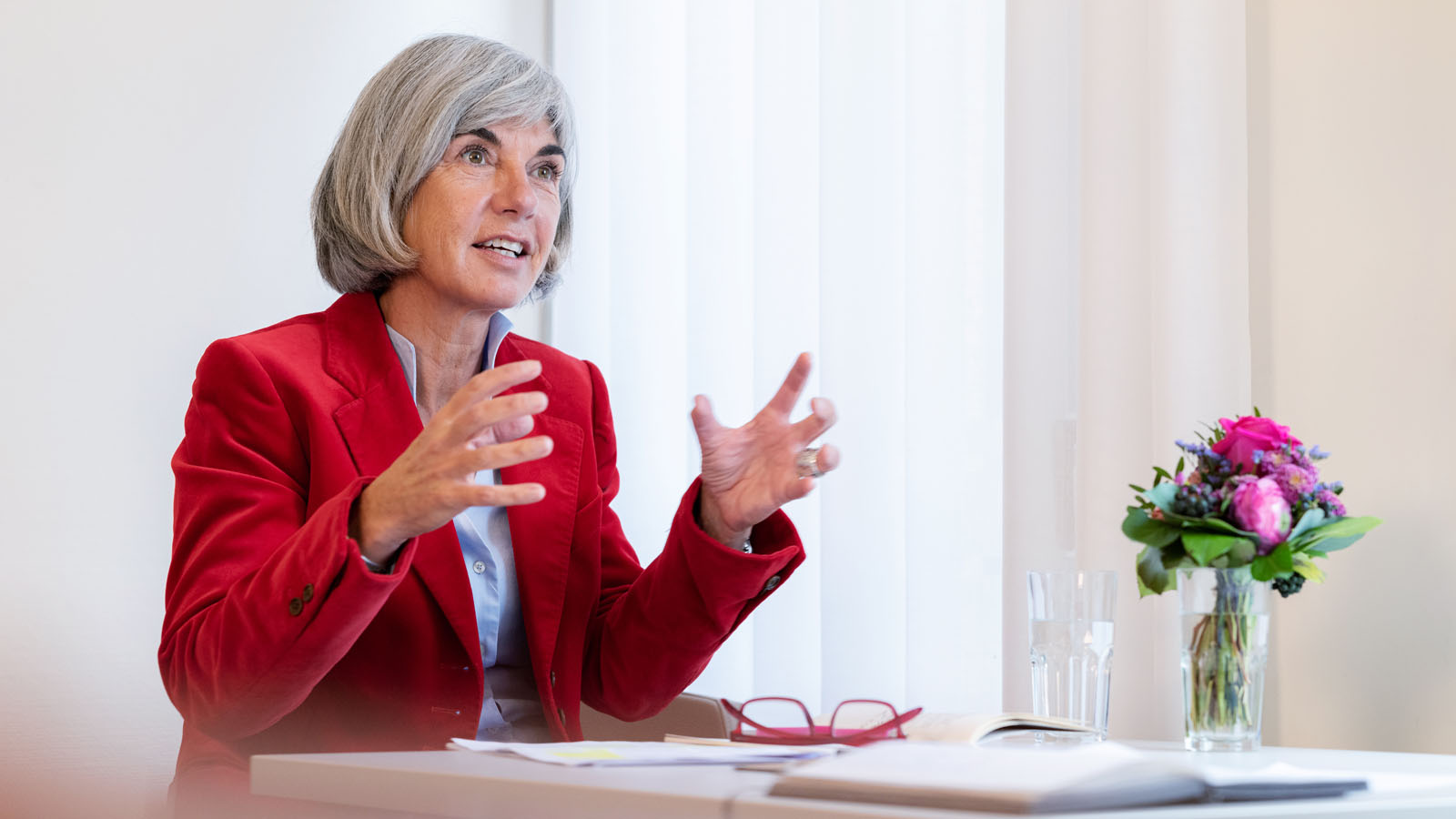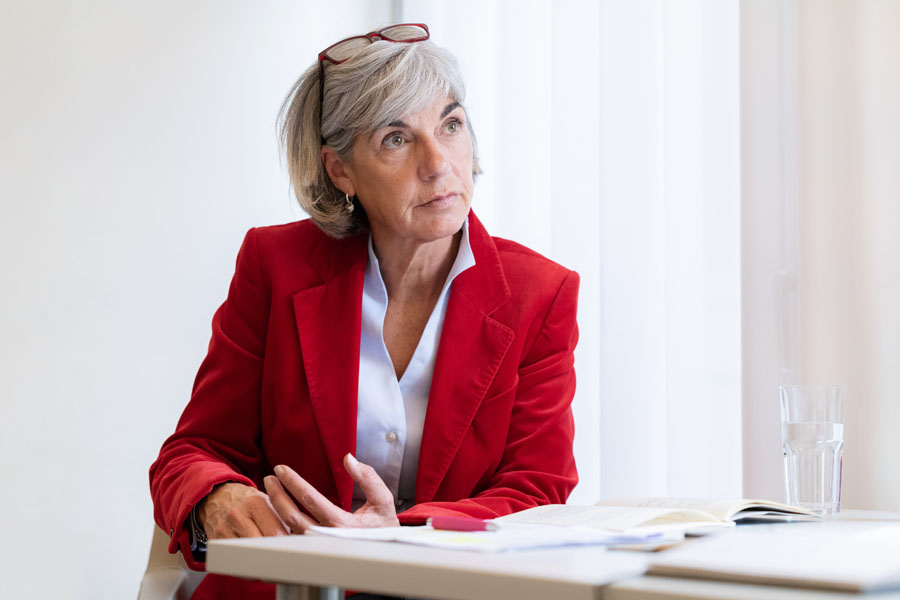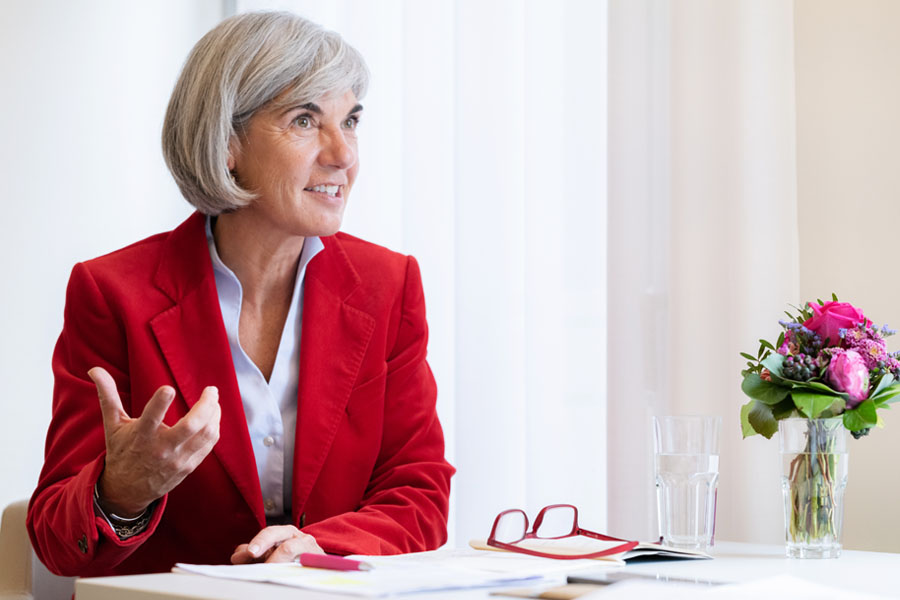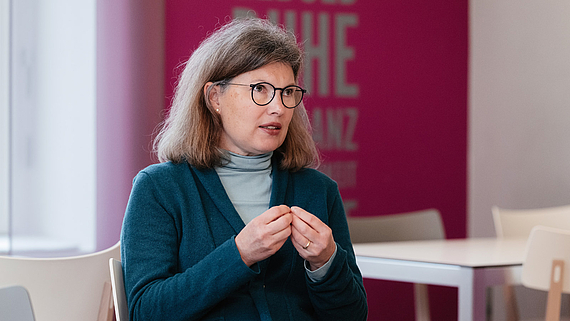Relationship between care professionals and patients
“We share everyday life with our patients”
The care professionals at Klinik Meissenberg are an important part of the treatment team. Care manager Monika Binder on the difficult path between closeness and distance.

The patients at Klinik Meissenberg are not in need of care in the conventional sense, like those in a general clinic or rehabilitation facility. What does care involve at Meissenberg?
Monika Binder: It is very similar to an acute care clinic in many ways. Our care professionals are with the patients 24 hours a day. Our clinic is organised into departments, for example for depression and burnout, psychosomatics and pain, anxiety and emotion regulation, crisis management and the Paracelsus private department. Of course, we don’t provide care in the sense of physical medical care. We see the whole person, including their emotional distress and social needs. Our care professionals share everyday life with the patients, also accompanying them at mealtimes, for example.
Could that be too intimate for some patients?
We are aware of this risk. The care professionals do not spend all their time with the patients. They recognise when distance is needed or when they need to intervene or ask questions. We also give patients space for themselves. The range of options on offer is crucial, such as active listening, a mindful walk, taking patients seriously in what they reveal to us and working with them to determine what kind of support they need.
The interpersonal relationship between the patient and the care professional is therefore central. Is there a set of rules and defined processes for this?
Our work is evidence-based. This means that we incorporate new theoretical findings and professional care expertise, but also the patient as an expert on their own life. Many things are regulated and measurable. As soon as we make initial contact with the patient, the care relationship begins. It is at the heart of our work. In the care process itself, information is gathered, abilities and problems are recognised, and actions and measures are planned, derived and re-evaluated.
So the relationship with the patients is not just intuitive, but the care professionals have specific tools that can be measured?
Absolutely, anything else would be unprofessional. We work with the patient to determine her care diagnosis and, whenever possible, take measures with her so that she can find stability again, for example. We adapt the care process and derive new actions from it. This can be seen in the interprofessional patient documentation. Our tasks are clearly described. When our care professionals have meals together with the patients, they are doing their job, even if it may not seem that way. However, the care professional must be able to intervene at the right time and in the right measure, provide assistance, take a step back, possibly protect someone and mediate. The observations and actions are also documented accordingly.
What happens if a patient reads too much into the relationship with a care professional and suddenly thinks she has found a friend for life?
That happens. Shaping relationships always has to do with your own values and the signals that are sent out. We also look closely at these situations within the team and in interprofessional supervision. In such a case, the end of the relationship after the end of treatment must also be discussed. It is just as problematic if, for example, sensitive information is only entrusted to one care professional. Although this can be flattering, it is also a danger that the closeness and distance of the professional relationship is no longer right. In such a case, it is made clear that the care professional always acts as part of a treatment team.
So transparency in the treatment team is a key value?
Absolutely. Relationships between care professionals and patients are dynamic and sometimes patients pursue their own goals, which are not always healthy. It is essential for our staff – whether in caregiving or other disciplines – to openly discuss this. This also serves to protect the employees themselves.
Nevertheless, are there closer and less close relationships between care professionals and patients?
Yes, of course. Each patient is assigned a care professional. A somewhat stronger caring relationship can and should grow here. This specialist is responsible for the care process and for accurately recording all relevant information.
How do care professionals find the right balance between closeness and distance?
Despite our great empathy for the patient, we maintain a professional perspective. That is the difference to a mother, for example, who is going through a crisis with her child. Emotions are easier for care professionals to control. We have a professional relationship that is limited in time and focused on achieving specific goals. We have regulations and must be able to hand over our tasks to the next shift. The relationship with the patient may be a topic of discussion in reports or joint meetings with other professional groups. We receive feedback from the outside, which is important in shaping relationships.
What distinguishes the work of caregiving from that of therapy?
We work together to find out what it takes to help the patient find solid ground again and take responsibility for herself. Based on the goals derived from the care diagnosis, we look at what we can change together with the patient during her stay so that she has the tools she needs to function stably again at home – taking into account her deficits and all her abilities. We focus on the patient’s everyday life and experience the patient in a milieu-therapeutic setting, where she displays her behavioural patterns. The patients practise tasks that we observe and document. Care is also therapy and there are many interfaces between the different professional groups. Good consultation with each other is therefore crucial for the patient.
What is someone getting themselves into when they decide to pursue a career as a care professional in a psychiatric department specifically for women?
The care professional engages with the patient and tries to see the person behind the illness. This allows her to learn about her vulnerability, her sensitivity and what makes her different, and to appreciate the diversity of the person. She sees both the healthy and the unwell parts. She also takes the patient’s social environment into account. Women behave differently towards each other than when men are present. The atmosphere is generally much calmer. Patients support and care for each other. They often show solidarity with each other and are more confident about getting involved. Women with a migration background in particular open up more easily among their peers. Aggression is directed less towards others and more towards oneself. Or they manifest themselves in dissociative states. And of course there are also “cat fights” and demanding expectations. Overall, however, I feel a much greater sense of gratitude and warmth.
“Women behave differently towards each other than when men are present. The atmosphere is generally much calmer.”
Monika Binder
What requirements do care professionals need to meet?
Interest in and curiosity about people is central to the complexity and otherness that we encounter in psychiatry in particular. It requires an empathetic, compassionate and positive attitude. They must be able to engage in an equal professional relationship with the patient. It takes patience, flexibility and the ability to listen actively and attentively. It takes strong communication skills to put what you hear into words and openness to values other than your own.
How will the caring profession develop in the future? The keyword is skills shortage.
Our certified healthcare assistants (EFZ) offer great potential. Many then go on to further training. They are our future students in the healthcare sector, whether as care professionals (HF/higher technical college and FH/university of applied sciences) or Advanced Nursing Practitioners (ANP). The profession will expand into integrated care. This is due to an ageing society and multimorbid chronic diseases. There will be new models for the organisation, especially with regard to the shortage of skilled workers. The role of former patients will also become more important. They have a wealth of experience to draw on. This concept of so-called peer work is already being pursued by more and more psychiatric clinics. When patients get help from people who have already been through this, it can be very valuable.
Is the profession attractive enough – also financially?
Yes. I still think this is the best job in the world. It is therefore all the more important to communicate this to the outside world. It is about fair wages so that we remain competitive. But it is also a matter of being able to fill all of the approved positions. So that work is balanced with leisure time and family or friends, and self-care is not neglected.
Monika Binder
Monika Binder is the head of care professionals at the Meissenberg Clinic and a qualified care professional HF with a Master's degree in Gerontology from the Bern University of Applied Sciences.
She leads five team leaders and oversees the training manager, the care professional development specialist, and the infection prevention specialist. The care professional department at the Meissenberg Clinic comprises 45.6 full-time positions, six apprenticeships for care professionals (FaGe EFZ), and six HF students.




